A pathological liar is someone who excessively lies. They exhibit a pattern of consistent dishonesty that feels impossible to stop. Pathological lying involves an irrational need to fabricate stories, events, or facts.
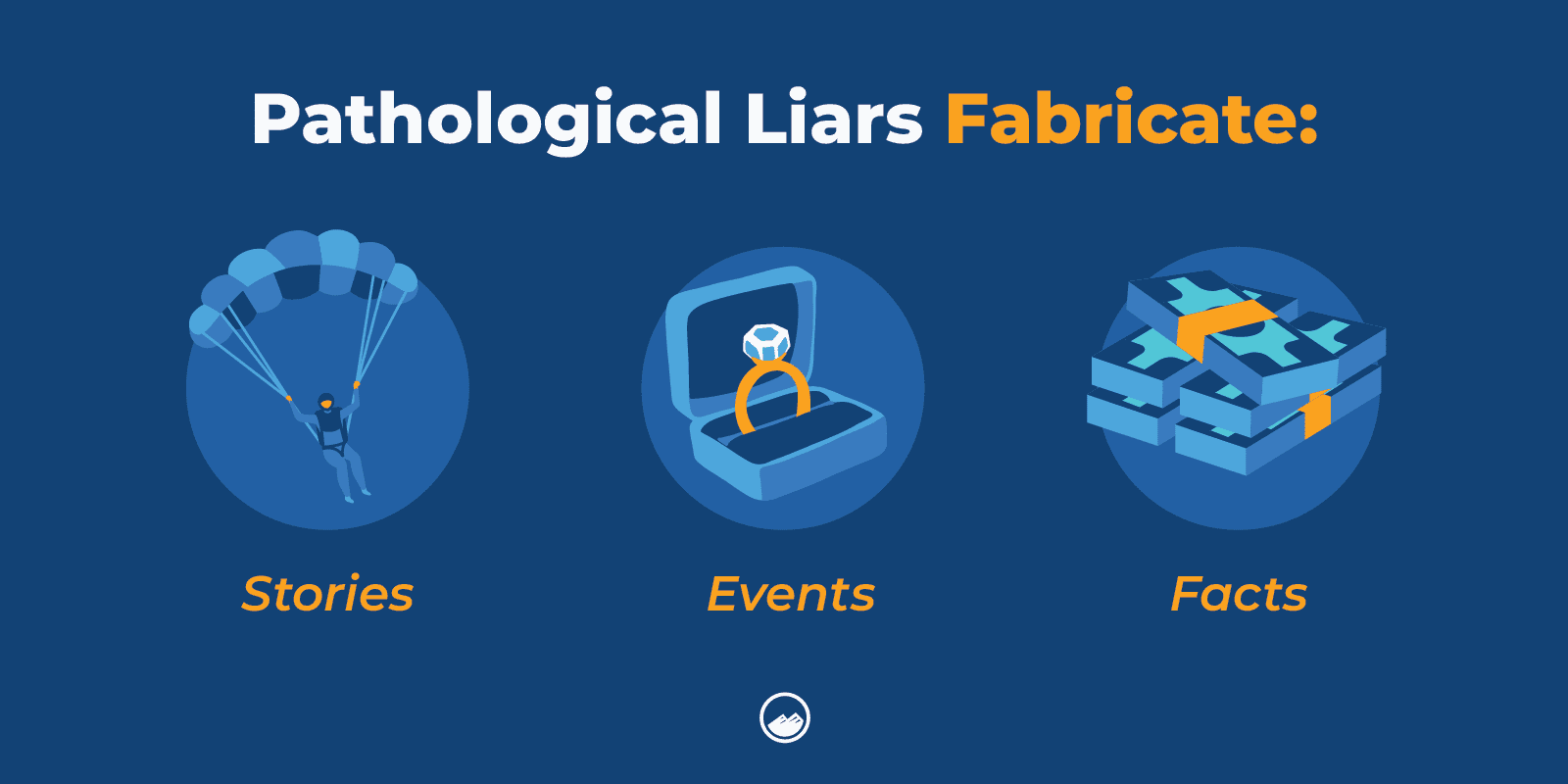
According to the American Psychological Association, the lies pathological liar tells impacts their functioning, contributes to distress, and can become dangerous for themselves or the people around them.
While many people may tell white lies from time to time, pathological liars lie out of habit and sometimes aren’t even aware of their lying behaviors because they believe it themselves.
Some examples of pathological lies can be when a person makes up a false history, says they accomplished something even though they haven’t, tries to impress someone by lying, or claims they have a serious illness when they don’t.
The Diagnostic and Statistical Manual of Mental Disorders (DSM) lists pathological lying as a symptom of mental health disorders such as antisocial personality disorder or narcissistic personality disorder.
However, pathological lying is not listed as a mental health disorder on its own.
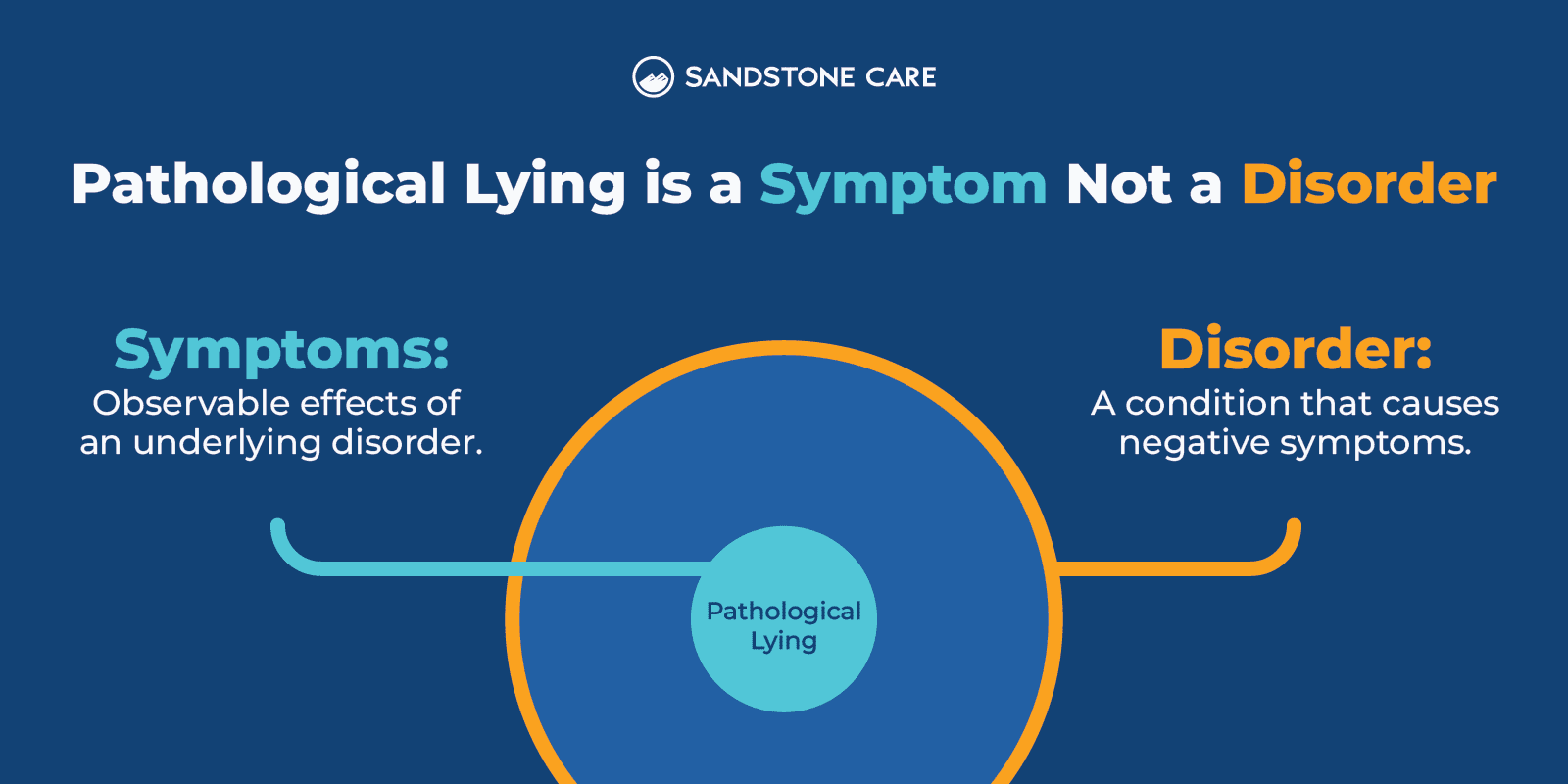
The root cause of pathological lying may be tied to genetics in some cases or can occur because of factors such as low self-esteem or a false sense of self.
Sometimes a person lies pathologically because of an inherited mental health disorder or condition.
Pathological lying is unhealthy for the individual and can harm others as well.
However, pathological liars don’t usually intend to hurt other people. Excessive lying is normally a force of habit and a need to feel important; it is not usually centered directly on hurting others. However, habitual liars often cause distress to the people around them.
Often, pathological liars aren’t aware of all the lies they tell, and they may believe them.
This can be because, sometimes, pathological lying may develop as a coping mechanism or stem from a mental health disorder.
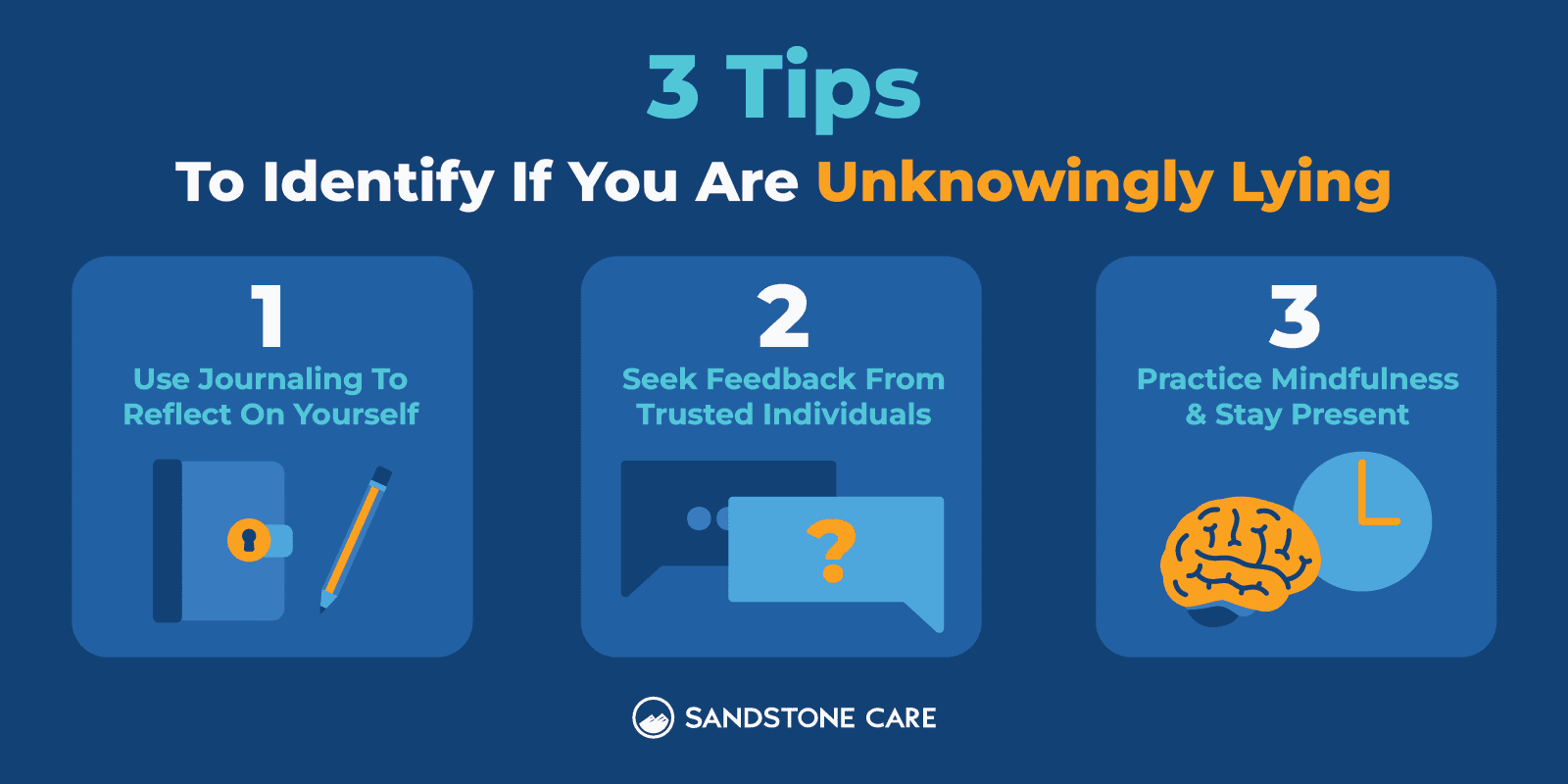
If you feel like you cannot stop pathologically lying, that could be a sign that you are using lying as a way to cope with stress, boosting low self-esteem, or even underlying mental health conditions. It can also be a response to past traumas or difficult experiences.
It is important to seek help from a mental health professional to help uncover the root cause of your challenges, especially since pathological lying can stem from many different experiences.
A compulsive liar lies out of habit.
Compulsive or habitual lying is when someone tells lies, big or small, often for no apparent reason. Compulsive lying doesn’t always mean that they are trying to cover something up or be dishonest, often it is an urge that does not have a traceable motivation.
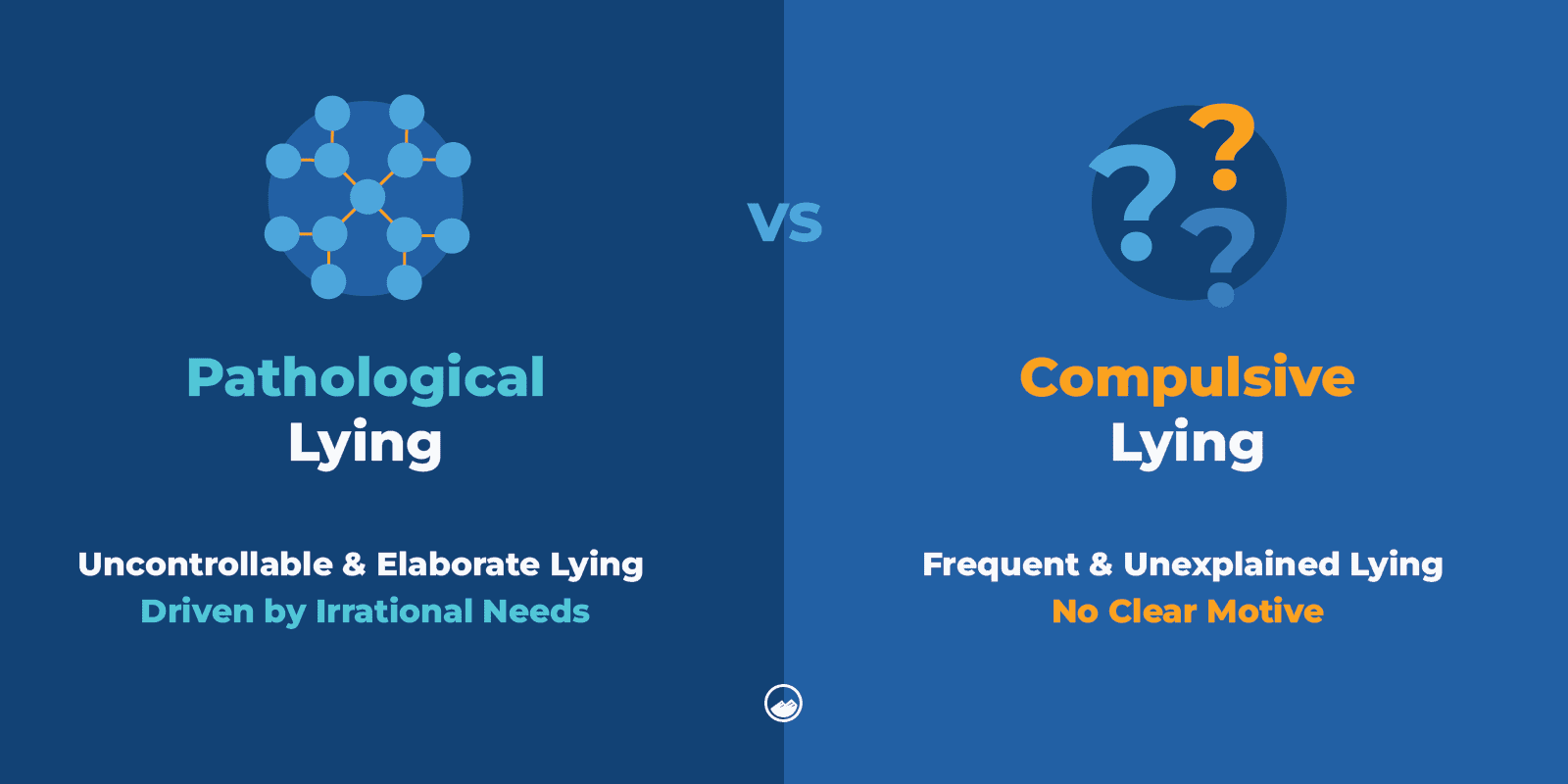
Sometimes, “pathological liar” and “compulsive liar” are used interchangeably.
However, when comparing pathological liars and compulsive liars, the motives can be different.
A compulsive liar may lie from fear or anxiety or to cope with difficult feelings. A pathological liar may lie to get what they want or uphold a certain image, such as in psychopathy. However, the reasons a pathological liar lies can vary from person to person.

Pathological lying can be considered worse than compulsive lying because a pathological liar excessively lies and may do so to get what they want or to deceive others.
However, all types of lying can cause distress in relationships, career ambitions, and social goals.
Often, compulsive and pathological lying go hand in hand.
Compulsive lying falls under the category of pathological lying, which means that a pathological liar can also lie out of habit.
There can be various causes of pathological lying, which may include:
Pathological liars may lie for a variety of different reasons.
They may lie to gain something or create an image of themselves. A person may also pathologically lie out of fear of abandonment or rejection.
However, these reasons can also stem from mental health conditions.
The root cause of pathological lying can be different in each individual.
Pathological lying may stem from low self-esteem, a false sense of self, or an underlying mental health condition.
Certain personality disorders can cause symptoms of pathological lying, such as borderline personality disorder (BPD), narcissistic personality disorder, and antisocial personality disorder.
Mental illnesses that can cause symptoms of pathological lying can include:
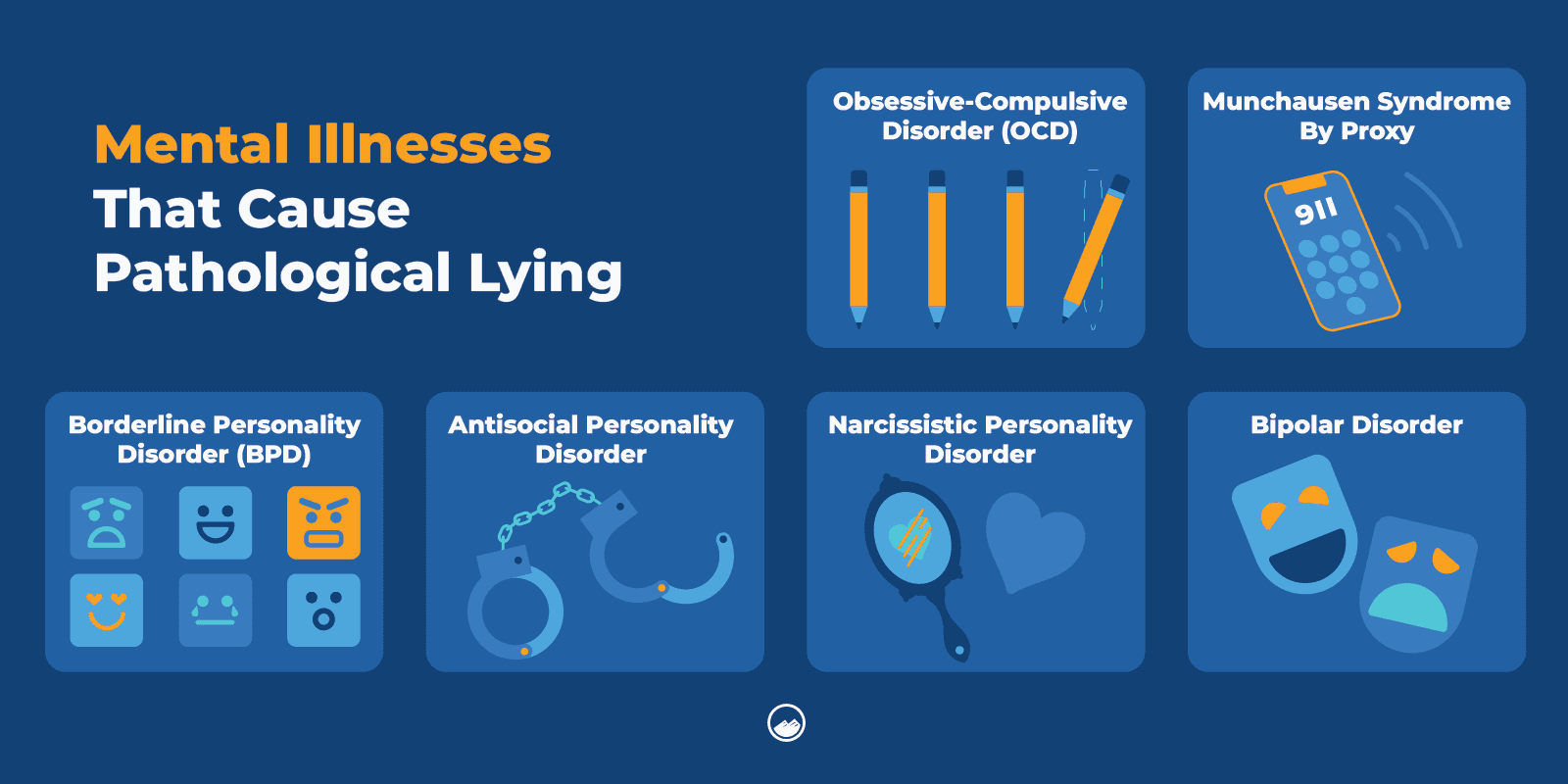
Mythomania is a psychological condition that involves the individual feeling the need to lie chronically and excessively.
A pathological liar is someone who excessively lies and has difficulty controlling or stopping their lies.
When a person follows a compulsive pattern of lies that has a negative impact on their lives and the people around them, they may be a pathological liar.
In some cases, pathological lying may involve a genetic factor.
A condition called pseudologia fantastica is characterized by telling outrageous lies with no apparent motive or reason.
When pathological lying stems from a mental health condition such as narcissistic personality disorder or antisocial personality disorder, there may be a genetic component involved.
Sometimes, a person may pathologically lie out of insecurity.
They may lie to try to boost their self-esteem or as a way to feed into a false sense of self. They will sometimes act as if they are a different person as a way to feel more confident.
When a person is a pathological liar, they may display signs such as:

Pathological liars use lying as a defense mechanism against low self-esteem, shame, a lack of self-worth, or fear of abandonment or rejection.
The biggest signs of pathological lying appear in someone who:
Pathological liars also become anxious when they talk or even defensive when you ask them questions or confront them about lies. A pathological liar may resort to gaslighting or manipulating another person’s sense of reality in order to keep themselves from taking accountability.
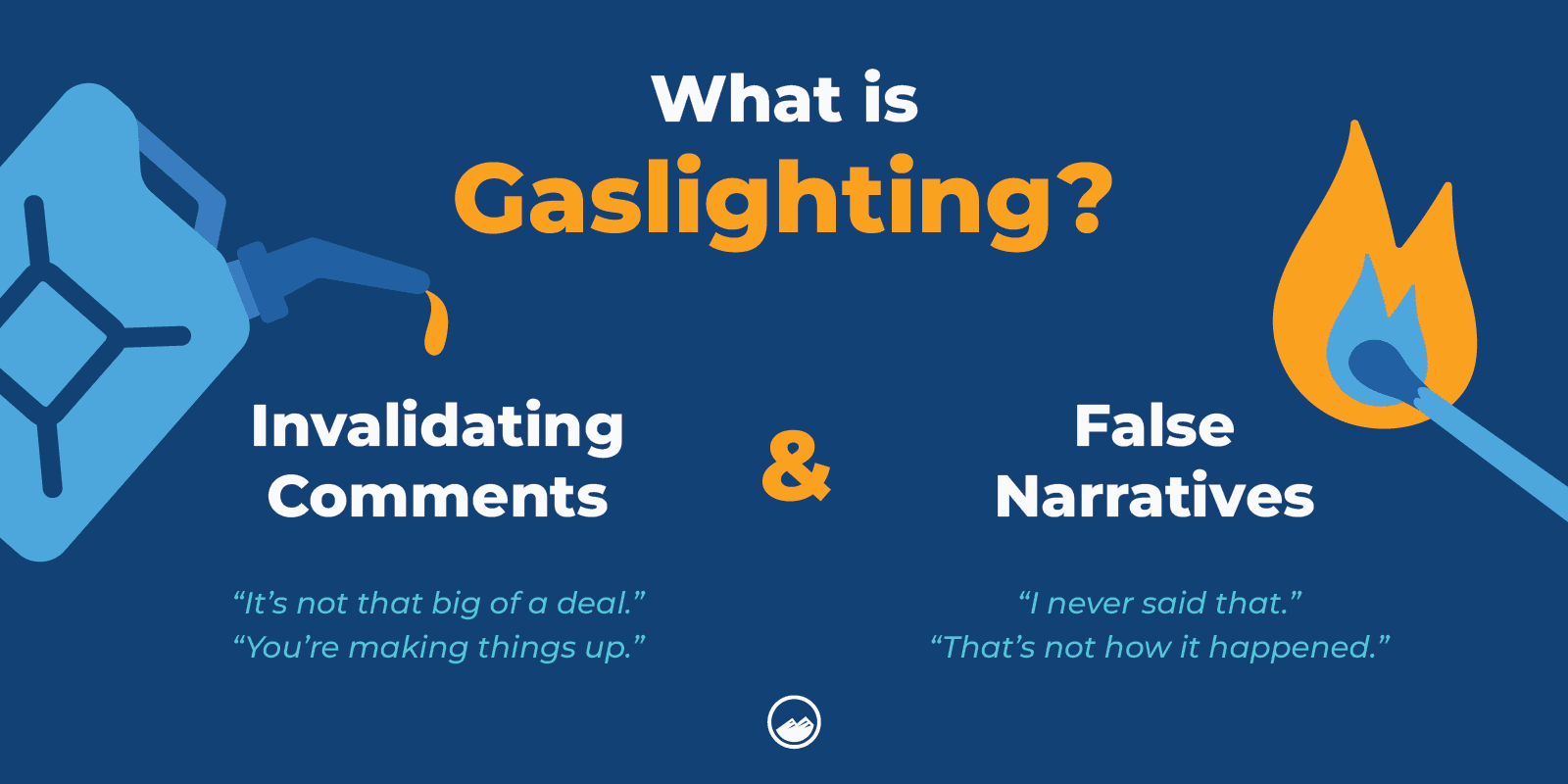
A pathological liar will likely not admit to their lies.
Even if everyone knows that they are lying or you have proof they are lying, they may either believe the lies themselves or won’t own up to it. They will often find scapegoats and blame others for causing them to lie.
While most people tell little lies every once in a while, a pathological liar often lies more than five times a day, some even 10, 20, or more.
When a pathological liar is caught, they won’t admit they were lying and will likely become defensive.
Pathological liars may try to deflect the blame, find excuses for their lying, minimize the importance of the lie, or admit only to a small part of their dishonesty.
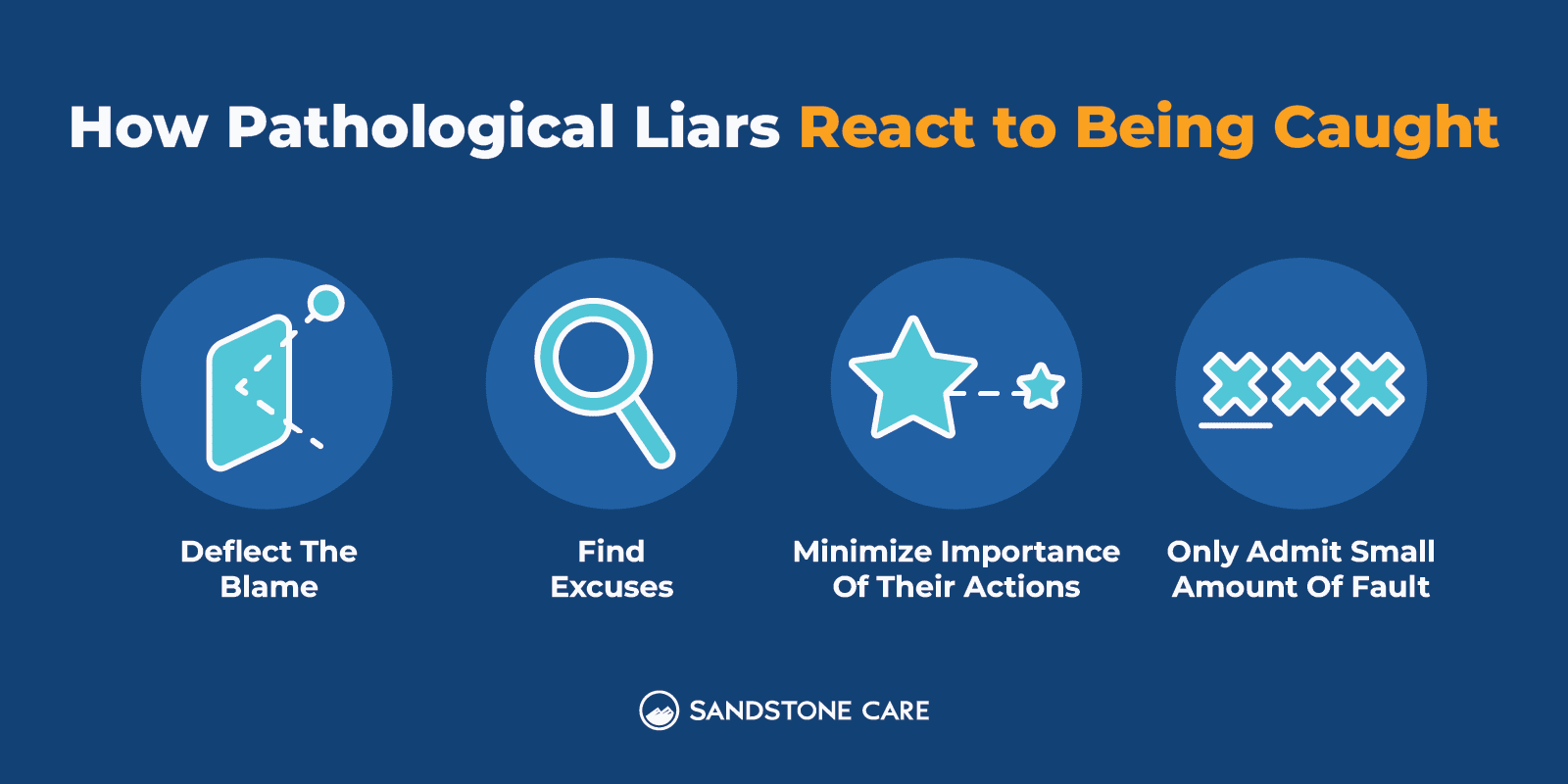
Some pathological liars believe their lies and may not be fully aware that they are lying.
This occurs when pathological lying is a symptom of an underlying mental health condition.
Most often, pathological liars don’t show any remorse or guilt about their lies.
It can be hard for pathological liars to apologize because they often genuinely do not believe they have done anything wrong.
When they do apologize, they may seem to offer a sincere apology but return to their pathological lies soon after.
However, it is possible for a pathological liar to heal and to mend relationships if they get the correct psychiatric help.
Yes, a pathological liar is capable of change.
When a person addresses the underlying root cause of their pathological lying, they can learn how to cope with and manage what is truly going on.
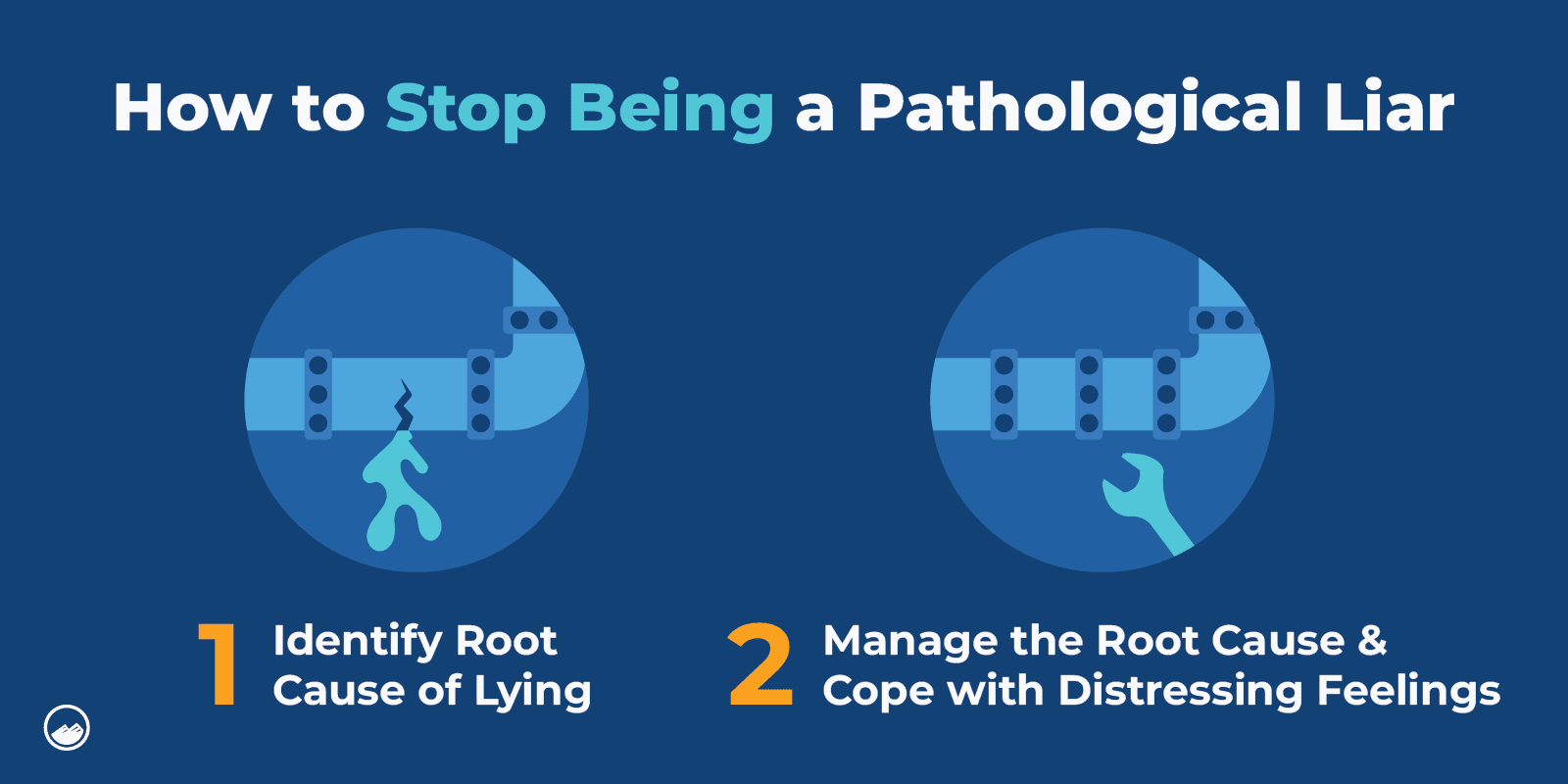
If you have a loved one who is a pathological liar, it can be hard to communicate, to trust, or to not take things personally.
There are ways you can be kind and supportive while also being clear, setting boundaries, and being firm with them so that they know where you stand when it comes to their lies.
It is important not to take things personally when interacting with a pathological liar. You are not the reason they are lying.
Set boundaries, stay calm, and avoid engaging if the situation escalates.
If there is a pathological liar in your life that you are planning to have a conversation with regarding their lies, there are different ways you can approach the situation.
One is first by paying attention to their behavior and what they say and noticing any inconsistencies in their actions or words.
Having a neutral conversation that isn’t confrontational or full of detailed questions can help a person get a sense of their patterns, body language, and tendencies so that when you do bring up something unexpected to them, you can be aware of how these things change.
When you are more aware of a person’s patterns and look out for the signs, it can help you determine whether or not they may be lying to you.
Setting boundaries is important if you have a relationship with a pathological liar, whether a family member, friend, partner, or someone else.
One part of setting boundaries with a pathological liar is being clear with them and communicating what you will and will not tolerate.
This may mean limiting time with them, not taking part in certain conversations, or even taking space away from them.

Having a relationship with a pathological liar can take a toll on not only the health and well-being of the relationship but the individuals who are in it as well.
Sometimes, what is best for both people is to end the relationship.
Doing so can be difficult when the other person is constantly trying to talk you out of it, manipulate you, or confuse you.
It is important to be clear with your boundaries and decisions so that they understand where the relationship stands.
Having a strong support system and possibly getting professional help may help a person move forward after ending a relationship with a pathological liar and find healing.
A pathological liar has a loss of control over their lies, lies frequently, and lies compulsively.
When someone is a pathological liar, they may not be completely aware of it because they believe their lies or don’t realize they are lying.
If you think you may be a pathological liar, it is important to seek professional help because pathological lying can often be a symptom of an underlying mental health condition. The underlying problem can impact your health, sabotage your relationships, and damage your wellness over time.
Pathological lying often stems from an underlying mental health condition.
It may also be used as a coping or defense mechanism if a person has low self-esteem or to avoid rejection or abandonment. If the change has come on suddenly, it may be a result of a traumatic experience.
Pathological lying is not a diagnosis but rather a behavior that stems from an underlying condition or problem.
The only way to fix pathological lying is to address what is truly going on inside.
When it comes to fixing pathological lying, this may mean going to therapy or getting treatment for the underlying mental health condition.
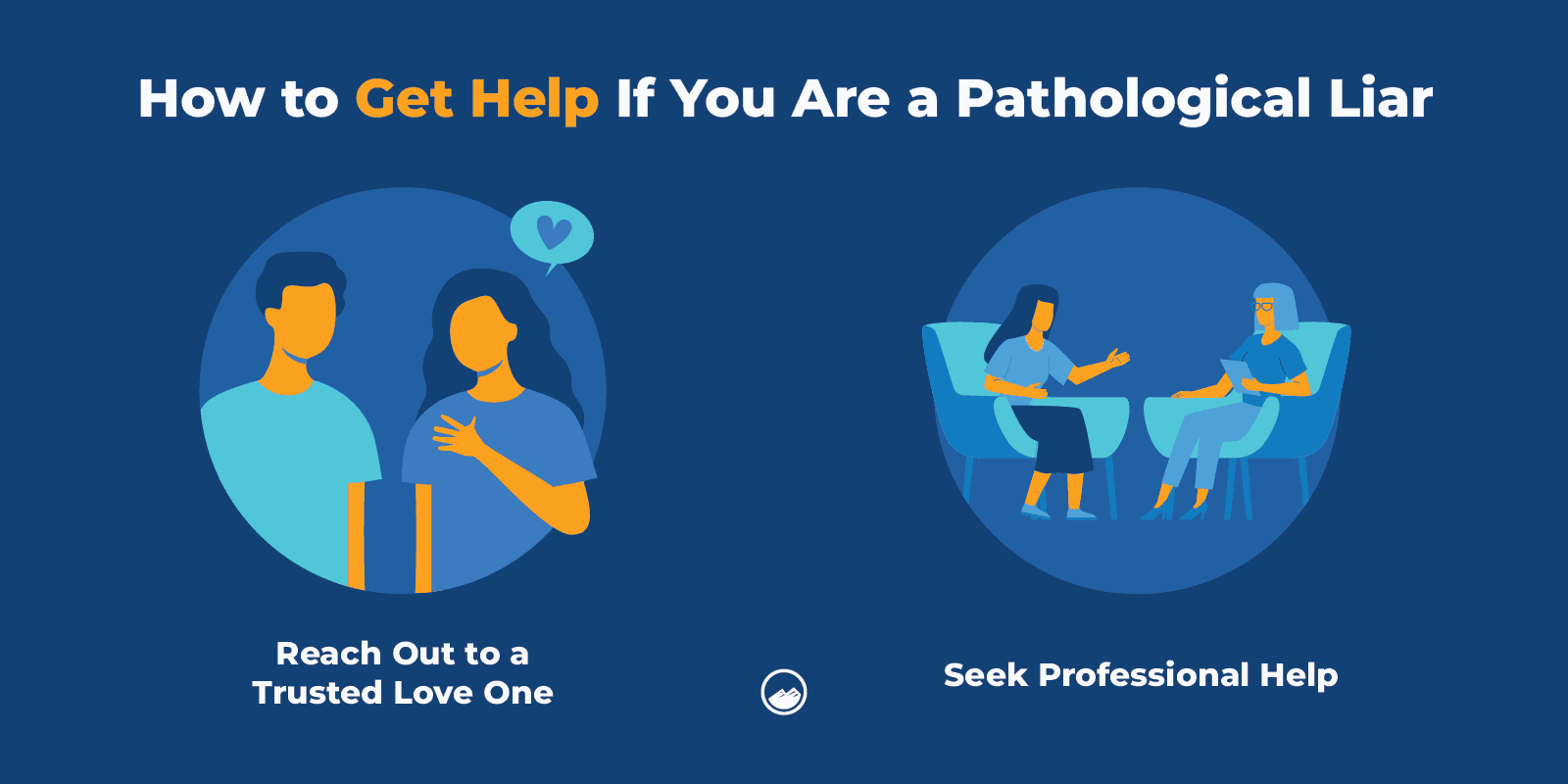
It is possible to stop being a pathological liar, but it does take time and work.
To stop pathological lying, you need to find the root cause of the problem, and treat it appropriately. It is also essential to work towards mending damaged relationships and taking accountability for lies you have told in the past.
One of the first steps in stopping yourself from being a pathological liar is being aware of your habits and patterns and acknowledging that there is a problem.
The second step is getting professional help in finding the underlying problem to help decide what the next steps are for you.
Psychotherapy can be helpful for some pathological liars; however, what works for some may not work for others.
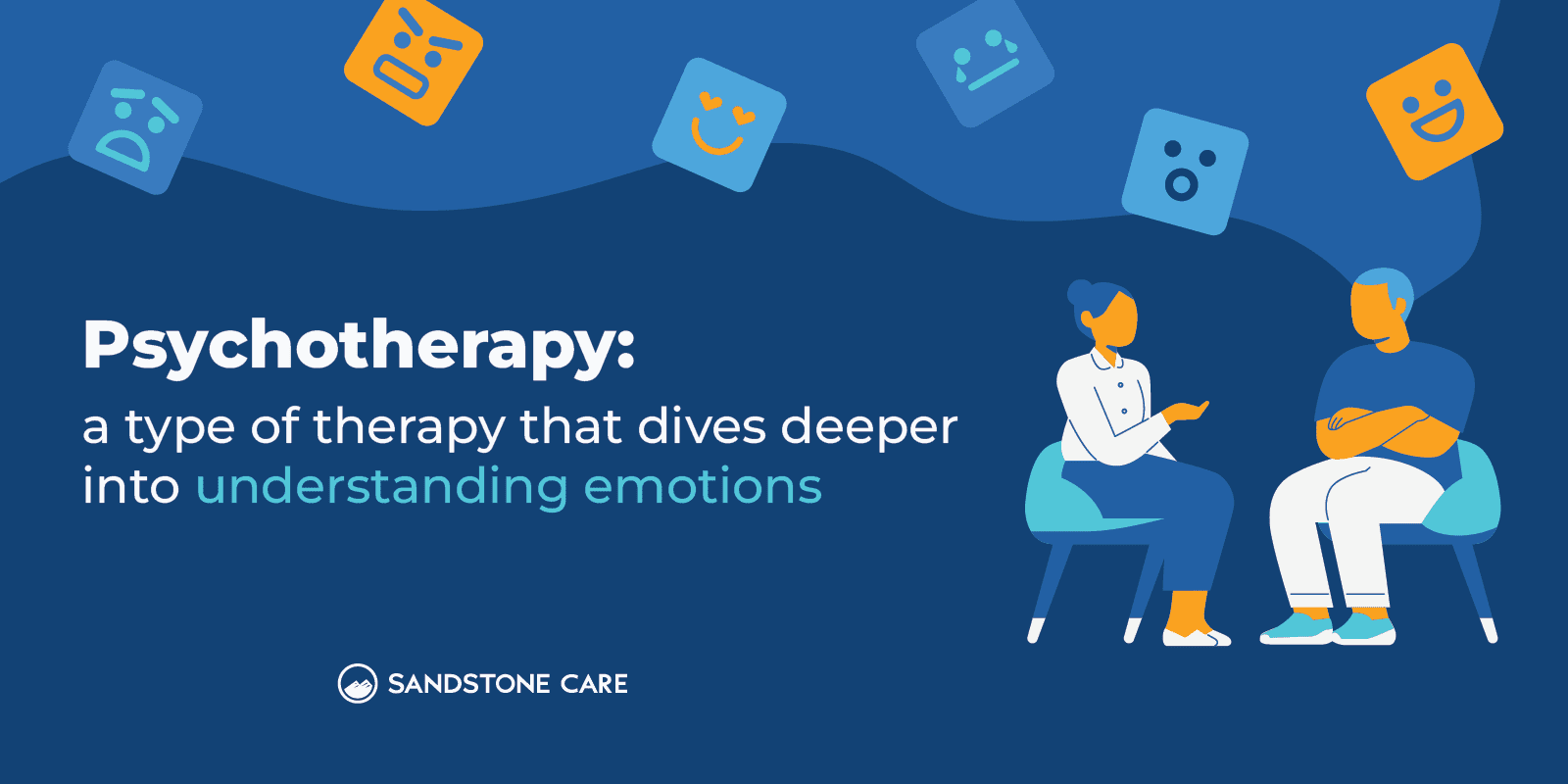
Aside from therapy, a person may stop pathological lying behaviors by changing their habits, communicating, and becoming more self-aware.
Part of changing pathological lying on your own is understanding its effect on you and the people around you, learning to build healthy habits and coping mechanisms, and doing the internal work it takes to address where the pathological lies are coming from.
However, if you think you are a pathological liar, it is best to reach out for help to see what is causing lying behaviors.
FAQ
Our goal is to provide the most helpful information. Please reach out to us if you have any additional questions. We are here to help in any way we can.
Both pathological and compulsive liars may believe their own lies.
This can be why pathological liars won’t admit to their lies or apologize for the things they have said because, in their minds, they are true.
A narcissistic liar is an individual who lies to get what they want.
Pathological lying can be a sign of narcissistic personality disorder. Narcissists can be very convincing when they lie and often experience pleasure from lying.
A narcissistic liar lacks empathy for others and often doesn’t feel shame or guilt about their lies, which makes it easy for them to lie excessively.
Most pathological liars don’t feel ashamed or guilty for lying.
Even when confronted about their lies, they might become defensive or change their stories. They often won’t admit to their lies, and even if they apologize, it is not because they feel guilty. They will continue their lying patterns afterward.
Pathological liars are capable of loving.
However, it can be challenging for pathological liars to build an honest and healthy relationship if they don’t get help.
If you have a loved one who is a pathological liar, it is important not to blame yourself for their lies. If you are looking for help with pathological lying or have a loved one who is a pathological liar, certain therapies such as cognitive behavioral therapy or group therapy can be helpful for both the individual and their relationships.


Pathological lying can be a symptom of underlying mental health conditions. Stopping pathological lying means addressing the underlying cause. Sandstone Care is here to support teens and young adults with mental health and substance use disorders.